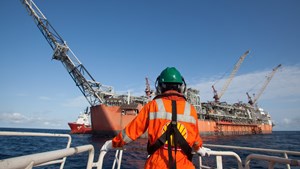‘Green Nobel’ winner warns oil majors may abandon Nigeria on pollution cleanup
(Bloomberg) — A Nigerian lawyer awarded a top prize for grassroots environmental activism has warned that international oil companies divesting from the West African country will abandon their obligations to compensate and clean up communities polluted by decades of crude production.
Multinationals such as Shell Plc and TotalEnergies SE have been selling onshore and shallow water permits to local firms for more than a decade to focus on deep-water projects off the Nigerian coast. That process is accelerating as the majors map out plans to transition to cleaner forms of energy and avoid problems associated with operating close to communities in the crude-rich Niger Delta, where the oil industry has wreaked massive environmental devastation.
“Once they have divested, then they will say that he who buys the assets also buys the liabilities,” Chima Williams, who on Wednesday was named a winner of the Goldman Environmental Prize, said in an interview. The risk is that “incompetent domestic companies” short of know-how and resources will end up in possession of the licenses, he said.
Williams, who is currently the executive director of Nigerian advocacy group Environmental Rights Action, has spent decades at the forefront of efforts to hold oil companies accountable for pollution from their facilities in the Niger Delta. The 52-year-old worked with farmers from two communities and the Dutch branch of Friends of the Earth to sue Shell in the Netherlands in 2008 over pipeline leaks that had occurred several years earlier.
In January 2021, the Court of Appeals in The Hague ordered Shell’s Nigerian subsidiary to compensate the villagers and also instructed the parent company to install better warning systems. The amount of money Shell will pay has yet to be determined.
While Shell didn’t respond to a request for comment, the company has argued most spills in the Niger Delta, including those in the Dutch case that affected the Goi and Oruma communities, are caused by theft and sabotage rather than equipment failure.
But Williams said much of the infrastructure for pumping oil and gas in Nigeria, including pipelines, “has outlived its lifespan,” which makes it “easy prey.”
“There is contributory negligence on the part of the operators,” he said. The prize, dubbed the Green Nobel, is awarded annually by San Francisco’s Goldman Environmental Foundation to six recipients recognized for their grassroots work.
Formerly a UK business with headquarters in the Netherlands, Shell relocated in January from The Hague to London – where it is also facing a potentially precedent-setting lawsuit brought by Nigerian communities. The UK Supreme Court ruled last year that more than 40,000 residents of the Niger Delta could sue Shell in England over oil contamination the plaintiffs blame on the company.
The claimants from Goi and Oruma filed their suit in Europe because they think it will be easier to enforce court decisions than in Nigeria, said Williams. “We decided to bring this case in the Netherlands where we feel that Shell respects the law, respects judicial orders,” he said. Other communities have contacted Williams and ERA about the possibility of taking legal complaints against oil companies overseas, he said.
Shell is considering bids for its remaining onshore and shallow water permits, while Total last month announced it would also seek to offload its minority interest in the same group of licenses. “You leave your legacy onshore pollution problems unsorted and you are receiving incentives for making investments in areas where it would be difficult to scrutinize what you’re doing,” Williams said.



